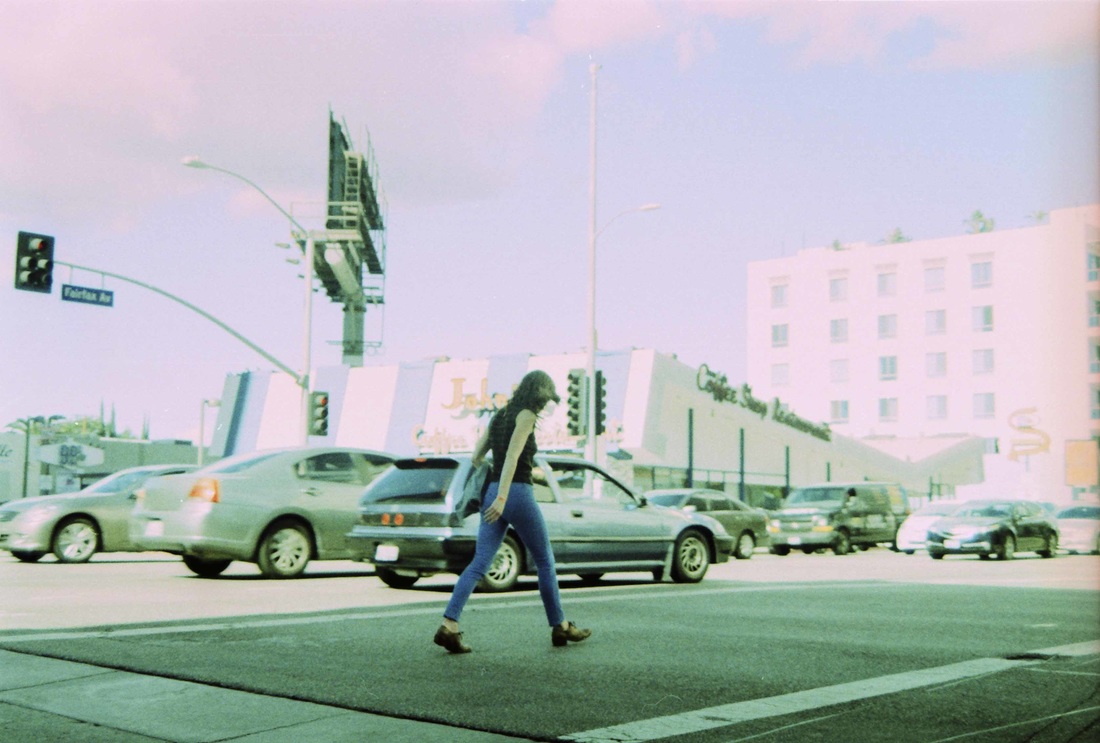|
The night was silent. We ambled forward together, a mobile living room, lightly populated with benevolent strangers. Nothing but the gentle hum of the bus's electric current. People sitting alone, nursing their own thoughts.
Then out of the silence, like cymbals crashing after a mellow adagio, I hear an ear-splitting stentorian roar: "DRIVER DO YOU LIKE DONALD TRUMP?" So inquired the great Mr. Weyling (read more here and here). In retrospect, it's strange he'd been quiet up until that point. Maybe he'd belatedly realized he was out of character, and felt the need to set things right. This funereal silence just won't do. Time for some classic Weyling. I responded in a normal, easygoing voice: "Um, we're not gonna talk about politics on the bus tonight." "OKAY," he boomed. "Yeah, we're gonna keep that to ourselves." Talking to him, and to myself. "OKAY. I'LL KEEP IT A SECRET WHO I'M VOTING FOR." "Thanks, man." Weyling's wailing is like no one else's. He might be my favorite shouting person to listen to. Yes, the list is short, but he's at the top! His diction is precise, Christoph Waltz's, and unhurried, like Jason Robards'. The difference, as I've mentioned before, is volume. Kakapo parrots and Blue Whales have nothing on this guy. Reader, I'm not making fun at his expense. He possesses a truthfulness of being not everyone has, and I stand by my earlier words, wherein I saw in him "an uncomplicated passion I find oddly adorable." There's something of the child in him, direct, and that I admire. Plus, well, doesn't all this make the evening more exciting? His line above was reeled off slowly, and the effect was unique; we're accustomed to yelled declarations that carry significant meaning or emotion. We expect them to be said quickly and heatedly. Less ordinary is hearing thunderous levels applied to highly innocuous statements of no great emotional import. I couldn't not smile. I recall a moment strolling down Third Avenue some weeks ago. Mr. Weyling was a bit ahead of me, his short, compact figure bobbing up down amongst the dense crowd– we as a city were impersonating a packed New York sidewalk. His hunched shoulders, furrowed brow, and italicized forward momentum were the very picture of determination. He stood out from the others in that he was giving himself some positive self-talk– something I hope we all do, but he was unique in not exactly keeping it to himself. Repeatedly, he would bellow out, "TRY TO TELL ME I CAN'T? I THINK I CAAANNNNN! TRY TO TELL ME I CAN'T? I THINK I CAAAANNNN!" He howled it to the skyscrapers with malicious glee, practically shaking glass, flattening imaginary antagonists with each step. Nothing wrong with a little self-confidence, I thought. "I LIKE YOU AS A DRIVER," he slowly screamed, if a raspy bass voice can scream. "YOU'RE A NICE GUY." "I try." "I'LL TELL YOU WHO I WANNA BE LIKE." He paused dramatically. Let's take a moment and consider his use of "wanna." Contractions are used to accelerate delivery. Nobody says "wanna" slowly… ah, but Mr. Weyling isn't just anyone. He's Mr. Weyling. Don't you love this guy? He wrapped up his dramatic pause by concluding with the exclamation, "MY FATHER." I was about to say something admiring, something about it's nice to have good parents one can respect, but he bulldozed in with, "HE'S OVER SIXTY FIVE YEARS OLD, AND HE'S STILL WORKING." "Really!" At this point he stood. Which made sense. There was no other way to emphasize his upcoming point: he was already bellowing. He was already emphasizing each word. What else can you do? The only thing left to do is rise! He's Dr. King at the Lincoln Memorial. He's Patrick Henry at the Virginia Convention. He threw his hands in the air and turned his face to the skies. Sleepers and thugs alike seated nearby looked up groggily, utterly flummoxed. What were they to do with this great fulminating vision in front of them, this avalanche of friendly and deafening vehemence? "HE'S NOT GONNA STOP WORKING, UNTIL HE FEELS LIKE STOPPING WORKING!" "Uh huh, he likes to work?" My normal voice sounded like a puny pipsqueak compared to his. "HE'S OVER SIXTY-FIVE YEARS OLD! I WANNA BE LIKE THAT." Who else says 'wanna' as such a deliciously slow, perfectly enunciated detonation? "I MAY NOT MAKE IT, BUT I'M NOT GONNA GIVE UP." Goh-nnuh. "Don't give up!" "I COULD GIVE UP, BUT I'M NOT GONNA!" Personally, I find something beautiful about his complete lack of irony. In an age when everything needs to have a layer of hipper-than-thou ennui, he is sincere. He wants to follow in the footsteps of his father, and says so. With unremitting gusto. Shortly thereafter he deboarded, but just because the bus was driving away and he was no longer nearby didn't mean I couldn't still hear him perfectly. His half-a-block-away bellow read now as an ordinary voice right beside me. It said, "I aspire to my father." I was reminded of the great Novalis quote, where he writes, "I am always going home, always to my father's house." My philosophical reverie was shaken by further Weyling. He had other pertinent information he needed to share. I was all ears. "I PUT ON COLOGNE!" he screamed, with the urgency of an untamed drill sergeant. "A LITTLE DAB HERE, AND A LITTLE DAB THERE!"
8 Comments
To my fellow humans the terrorists,
Before you pull your next trigger, I would ask for a pause, not for my sake but yours: take in a full breath, and think of the smile on your mother's face. Think of the early times, when your parents were young, when sunsets lasted longer, when the biggest problem was schoolwork, acceptance from friends, or the hesitant expression on a pretty girl's face. Think of the taste of bread. Consider your goals now, and reflect on how they're all ultimately to do with loneliness, the search for belonging and respect and when we really get down to it, love. Know that I was all of those things too. My goals and memories are like yours, and as children we would've played together. The weight between your shoulders is one I can feel, different but familiar, a lack of love to be solved not with hate, but with love. We are all bitter over something. Let us not fight rigid ideologies with other rigid ideologies, or address violence and mayhem with the tools of violence and mayhem. In the business of fighting ideas, there is only one successful method: other ideas. The great battles of the twenty-first century will be intellectual battles. War is simplistic, and blinds with tragedy; it traffics more than perhaps anything else in nostalgia, and is outmoded and archaic as a problem-solving format. You are so much better than this, my friend. I am disappointed in you. You knew the face of goodness, once. I do not think you have completely forgotten how to see. -Nathan Vass As you know, I was present during last year's attacks in Paris. It hasn't felt right to share these photographs until now. Now it feels wrong not to share them. Click here for the galleries. I'd never seen her at Fifth and Jackson before. Rose's squat profile was instantly recognizable, her silver hair backlit by the storefronts opposite.
"Hey, Rose," I said, looking down through the gloom at her stroller. "Hey, Nate," she replied, hobbling a step forward. Quickly, knowing I've turned her away before (read here and here for the backstory on this), she said, "I got a new stroller but it has broke wheels too." She may not have been able to see my face in the darkness from out there, but I smiled with my voice. "That's okay, thanks for getting a new one. That's what counts." "It still has a problem." "That's okay." Rose stepped in keeping pace with the glaciers of old, cursing the nerve pain which shot through her swollen legs at each step. Glaciers with nerve pain would move slowly. She still demanded the front seats be lifted in a particular fashion I can never remember. I really ought to write it down. Tonight a young male passenger– don't say the youth never help their elders!– helped her out for me. I couldn't see her as we carried on our way, but could hear her just behind me. Snatches of another life drifted within earshot; I strained for the details. She was ready to go home, she sighed. "I got up at 4am… 'cause when people are in pain they make a lot of noise. He's been in a lot of pain." She kept saying "he," and I never got an answer on who he was; only that he was a vet, and someone special. I said that's a hard life, being a vet, and she didn't disagree. He was going in for surgery, she said, he went in for surgery, but he's okay now. "I'm glad he's okay." "I'm gonna take care of him," she remarked. "He's not gonna do anything to me." "That's good." The silences, the barest sentences, and the lifetimes behind them. "You can sit down! It's safer to sit down!" she hollered at an Asian man, trying to be nice. Genuine negativity is contagious, but so too is genuine positivity. I caught a glimpse of her craggy face in the mirror, her grey-blue eyes still blazing in late age. I'm sure she fit most people's definition of pretty at some point in her life. Does she reflect on her past, as I do, when the pain is not as strong? Sleepless in the wee morning hours, lying in repose, a reverie between the ceiling and ourselves. I hope there are good memories. It's a solitary act, and something we all share. "Getting operated on…" she was saying something about medical procedures. Then a thought on housing, how they're gonna tear her house down, putting up condos instead; I can understand that frustration. "They need to be more kind to me." Her grumbles mingled with the gentle hum of the electric bus. Then I heard her, and I heard her again. She said it more than once: "everybody just needs to be loved." We Americans are a vocal sort. We wear our emotions, our opinions, fear, anger, ignorance– loudly, on our sleeves. But there are things even we don't bray out to the world. I believe loneliness is the premier element of the human condition. No other state of being is experienced as pervasively. It doesn't matter how popular you are. We are individuals, and we process things away from others, deep within our own minds, and that is always and ever a singular act; how many millions of thoughts will you never share with anyone, because they were too esoteric, inconsequential, hard to contextualize, or private? We brush our teeth, tie our shoes, and hang up our clothes alone. We crave acceptance and love, or at least acknowledgment, from others in an effort to combat it. It's not quite up there with the fact of death, as the motivating engine for all human action, but it's close. But we don't ever talk about it. We wax and whirl about the subject, and because the condition is universal, we understand each other anyway. We talk about relationships, goals, psychology, and desire, but we never discuss it bluntly in relation to ourselves. "Everybody needs to be loved" is a valid statement on its own, but it's also code for something else, something deeper and more personal. I heard it in her plaintive voice. I know that feeling too. As she left: "Nate, I'm glad I got to see you tonight." She apologized she couldn't ride further, and explained that she really did need to go home. She took forever. That's fine, I said. Then she hollered into the wind, her cry reaching through the closing the doors, me turning the wheel out to pull back into traffic. She was yelling more nice things. So nice, perhaps it's good I didn't hear them. Some days later she was at the Andover Street bus stop. She was surrounded amongst her things in the bus shelter, camped out for an afternoon siesta of sorts. She didn't want the bus, but waved her hands upon recognizing me. She called out, repeatedly, until she knew I heard her: "thank you Nathan, thank you! Thank you, Nathan!" "That's a nice flower," I said. She held in her hand a single long-stem rose, light pink.
"Thanks!" she answered, cheerful and animated. I remember large brown eyes and flowing auburn hair. "A stranger gave it to me!" "Oh! That's kind of excellent!" "Would you like it?" "That's so nice of you! Thank you!" I set it on the dashboard, draped over the dials and toggle switches. What a perfect addition to the driver area. What made them ever stop designing things with such aesthetic touches? Why are there no fleur-de-lis and gargoyles on this bus? I grinned inside myself, feeling new and warm and validated. A short while later another young woman came forward, a student here at UW, with rippled blond hair and an Eastern European accent. I said, "how are you?" Ask it brightly. Watch a smile form on their face, as you mirror each other's best side. "Good!" she said, suppressing a laugh at my enthusiasm. "I like your flower," she said. "Thank you! A passenger gave it to me!" "Aw!" "Do you want it? You should have it!" "Me?" "Yeah, yeah. Happy, uh, Tuesday." "Ha! Thanks!" I asked about her day. We talked of school and work, and workstudy. She tossed her hair back. She was in the sciences. I asked what she liked most about her field. I like hearing people expound on their passions. Don't ask her name, I told myself. Don't say, I hope I see you again. I want her to know the flower is real. That it comes with no agenda. This is about strangers being lovely to each other, and paying warmth forward. I'm sure her conception of individuals whom she knows is fairly positive; but I want to be part of her positive conception of strangers. My mind returned to a note I was once given. A woman about my age handed me a folded square of paper. I didn't catch her face; too busy trying to stay on the wire on the pesky purple bus. I caught only a glimpse of cigarette pants and long black hair dashing into the twilight. I put her note in my breast pocket and continued along the route. At the terminal I unfolded it. It said endearing and adorable things. It also had no phone number. Which is how I knew it was completely genuine. |
Nathan
Archives
July 2024
Categories |




 RSS Feed
RSS Feed
